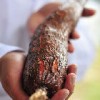 Cassava breeds that are resistant to two major viruses could soon be available to farmers in Africa.
Cassava breeds that are resistant to two major viruses could soon be available to farmers in Africa.
Cassava mosaic disease and brown streak disease stunt the growth and rot the roots of crops, respectively.
Mosaic disease alone destroys an estimated 35 million tonnes of African cassava a year — the difference between needing to import food into Africa and achieving food independence, according to researchers at the US-based Donald Danforth Plant Science Center.
The team has shown in the laboratory tests that genetically engineered (GE) tobacco plants resist brown streak disease. Their results will appear in Molecular Plant Pathology next month (August), Claude Fauquet, lead author of the study and director of cassava research at the centre, told SciDev.Net.Pending field trials will test the same modification in various cassava breeds selected according to farmers’ tastes and local growing conditions in Kenya and Uganda, he said.
The team is also awaiting approval to run field tests on resistance to brown streak disease with collaborators in Kenya, Nigeria and Uganda.
But it could be 2015 before the plants are approved for commercial use, said Fauquet, whose team is building local laboratories and facilities, and training African scientists and technicians to handle the field trials.
Researchers in Kenya and Tanzania are also expecting approval for field trials of cassava breeds resistant to mosaic disease, Morag Ferguson, a plant molecular geneticist at the International Institute of Tropical Agriculture, Kenya, told SciDev.Net. The team used a non-GE approach by cross-breeding native and wild strains of cassava to achieve resistance in laboratory and greenhouse tests.
Both teams hope for swift approval by the continent’s nascent biosafety regulation community, even though many African countries still lack clear biosafety laws.
Ferguson said that successful field trials of disease-resistant cassava could “prompt countries to get their biosafety regulations in place”.
Legislators are cautious of GE technology at first but if there is a chance of successfully controlling crop disease they would like to see those solutions applied quickly, Fauquet said.
But Anne Kingiri, a research fellow at the UK Department for International Development’s Research into Use Programme, said that the deployment of GE plants is not dependent only on biosafety regulations, nor are the regulations only dependent on the technology — country-specific social and institutional factors also play a role.
“Quicker passage of biosafety laws — which are pertinent for GE technology deployment — will depend on many factors, including honesty and transparency amongst researchers about benefits and potential risks,” she said.
This news story originally appeared at SciDev.NET: [html] [pdf]